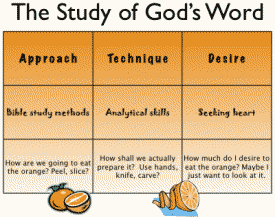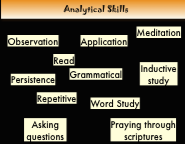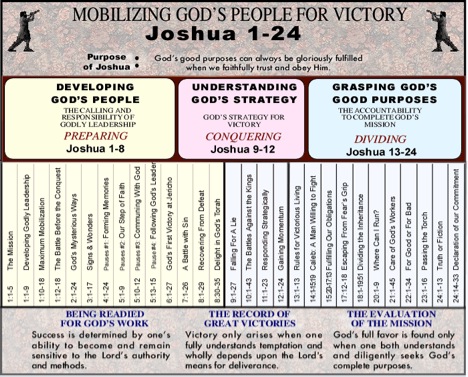|
Deepening Our Reflections
– Joshua 1:6-9 –
Paul J. Bucknell
Having put the command to meditate before us, we need to understand how meditation is properly integrated with personal Bible studies.
 Meditation should show up wherever we spend time in His word. We are often more conscious of the process of the study rather than on the message the Spirit is trying to tell us. We need to get more in tune with the Spirit. Meditation should show up wherever we spend time in His word. We are often more conscious of the process of the study rather than on the message the Spirit is trying to tell us. We need to get more in tune with the Spirit.
Learning how the Spirit teaches us is not only something that we need to learn and apply in our quiet times but also in any Bible study or Bible preparation time. After analyzing our studies in God’s Word, I have come to see there are three aspects to good Bible studies. I have used the eating of an orange or pineapple to illustrate it.
Desire: Seeking heart: How much do I desire it? Will I eat it?
Approach: Bible study methods: How are we going to eat the orange? Peel, slice?
Technique: Analytical skills: How shall we actually prepare it? Use hands, knife, carve?
The Desire
I have spoken about the aspect of desires in the first session. The desire for God to speak to us through the reading of His Word is normal, good and necessary. If in our reading of God’s Word, we do not really meet the Lord, then we should become dissatisfied. We want to meet God. He wants to commune with us. If it doesn’t happen, then we should seriously seek God until things are righted.
Some of us might be totally oblivious as to what is normal and right. If we have grown up in unhealthy families, then our concepts of God and relationships are usually distorted. For instance, if we have grown up in a family where the father did not speak with the children except maybe to scold them, what kind of hidden thoughts will this person have towards His heavenly Father? How will this affect His expectations on what God might say to him?
In fact, God, though high and lifted up, likes to spend time talking to His people. The sin is that we run along life without regularly conversing with our Heavenly Father. We need to know our need for Him and expect that He greatly desires to daily help us with all these issues. Notice that even Jesus Himself got His teaching from the Father, “Jesus therefore answered them, and said, “My teaching is not Mine, but His who sent Me” (John 7:16). If Jesus went to the Father to know what to say and teach, certainly we should also do so in every aspect of our lives. This is why Joshua experienced so many victories.
How much do we want God’s Word? How much do we really need Him to speak to us? Can we get by without ‘meditating?’ Once He reveals things to me, will I actually obey? This will show how much we really desire His Word. It is easy to say we will obey, but a whole different thing to actually carry it out.
 Our good desires are closely associated with three key words: faith, hope and love.
Our good desires are closely associated with three key words: faith, hope and love.
Faith is the expectation that God will speak to you during your time together.
Hope is the delightful reliance on God because of His faithful care for you.
Love is the wholehearted devotedness to treasure what the Lord says to you.
Behind any true and genuine spiritual discipline lies the fundamental expression of our dependence upon God. In our genuine search for Him, our fervent belief that He alone has the answers and that He alone really cares for us compels us to trust Him no matter where He leads us. Let us now spend more time on discussing the approach and the technique.
The Approach
We will not spend much time on the approach to reading and studying God’s Word. There are many other resources for this. In terms of our illustration, Bible study methods are how we open up the fruit to eat it. We have to make a decision whether we will peel or slice the orange. Bible study methods are different ways to open up God’s Word. Some are better than others. Each has its own advantage. The ‘Devotional Study’ is what we have been speaking about so far. For these studies to be effective, they also need to have an element of the devotional study in them. God’s Word is given that we might be shaped. We must respect this.
“All Scripture is inspired by God and profitable for teaching, for reproof, for correction, for training in righteousness; that the man of God may be adequate, equipped for every good work.” (2 Timothy 3:16, 17 More)
When God’s Word is rightly appropriated by the man of God, he is ready for any good work. God’s Word empowers us! If we feel unable or are very confused, then we are not rightly engaging in God’s Word. He will give us the faith needed to face each situation. If you are a teacher of God’s Word, then you need to be familiar with these studies of God’s Word. If you are not, you still can use many of them to deepen your own reflections of God’s Word in your life. It is good to think of these studies as methods of meditation upon God’s Word. Again, the main point is to capture a truth that God wants to pass on to us.
Bible Study Methods
As we begin briefly introducing different Bible study methods, I want to first emphasize the reason Bible studies are so important. If you have taught the scriptures before, more than likely you have been enriched more than the students. I have heard numerous teachers, experienced and beginners, tell me this. But why is this true? It is because we, as teachers, have entered into the scriptures more than the students. The truth of God’s Word entered our lives more deeply and thoroughly. Jesus says that it is the truth that sets us free. “You shall know the truth, and the truth shall make you free” (John 8:32). Bible study methods are ways we usher the truth of God’s Words into our lives.
Below, we provide a quick understanding of each kind of study. The forms of Bible study requires a bit of time to introduce and understand. Fortunately, a simple book like Vos’ “Effective Bible Study” can do this. Let’s look at some of the more common Bible study methods. Some of these Bible study methods overlap with another study or are composed of doing several of them.
Analytical study focuses on detailed analysis of a biblical passage. For example, if we studied 1 Corinthians to see what it said about tongues (foreign languages), we would need to do an analytical study of 1 Corinthians 12-14. We would need to examine the exact words used and the situations in which they are used. For instance, John MacArthur in ‘The Charismatics’ has made a big distinction between how the word for tongues is used either in the singular which refers to a specific language or plural to refer to babel (nonsense or made-up and pretend language). These studies are great but often we need to do them separate from our devotional times because they require too much research.
Bible Book study: These are my favorites. I have studied many books of the Bible. My real growth and calling in the ministry came as a result of a Christian camp that showed me how to do Bible book studies. It heavily relies on the inductive method (described more later). Basically, one reads the book many times, divides it into chapters, providing each with a chapter title. Then each chapter needs to be divided into paragraphs with their given titles. We then, like detectives, study each passage to see what God wants to say through each passage.
At the end, one tidies it all up by coordinating the titles with the overall thrust of the book. Most commentaries do not make a book come alive with meaning. These studies sure do! We want to ask, “Why did God give us this book?” He has many messages in that one Bible book, but what is His chief message? What need is He addressing? Why does that Bible book mention this and not say that? In the end, after each study, we ask, “What is He saying to us?” The chart of Joshua below is one example of a Bible book study that started from many inductive Bible studies.
Biographical study: In this study, time is spent studying one person throughout the scriptures. We, of course, do not just study the person but learn why he succeeded and why he failed. We must ponder as to why God mentions him, what He says about him (or her), and how this person and his life choices apply to our own lives. For example, if you look, starting at the very end of Genesis 11 and on into chapter 22, you will see many things are mentioned about Abraham. Notice how many of his failures are mentioned. God has His purposes on recording these incidences along with his life. We should know why God does this.
Devotional study: A devotional study is usually a short but deliberate time in God’s Word. We make regular application of the things in our Bible readings to our lives. This focus on application must accompany other studies to make them profitable as Paul says to Timothy. We will spend time in God’s Word with a clear purpose that God would warn, exhort, comfort or help us.
 Inductive Bible study: This is a careful study of a passage to determine its original purpose and meaning. We look for clues from within the passage. Take one shorter passage, number 1-4 and successively answer each question. Inductive Bible study: This is a careful study of a passage to determine its original purpose and meaning. We look for clues from within the passage. Take one shorter passage, number 1-4 and successively answer each question.
#1 Observe: What does it say?
#2 Understand: Look up words, similar passages, etc.
#3 Interpret: What does it mean?
#4 Apply: What does it mean to me?
The Bible book study is built on this. This study enables us to see what the author was trying to say and let that message impact our own lives. If it was important for them, it is important to us. The Word of God was written not just those in ancient days but also for us.
“For whatever was written in earlier times was written for our instruction, that through perseverance and the encouragement of the Scriptures we might have hope” (Romans 15:4).
“For the word of God is living and active and sharper than any two-edged sword, and piercing as far as the division of soul and spirit, of both joints and marrow, and able to judge the thoughts and intentions of the heart” (Hebrews 4:12).
Synthetic Bible study gathers general observations about a book by examining its general structure. An inductive study takes clues from the passage itself, where the synthetic study looks at the whole from an outside perspective. They will focus on questions like, “Why is the book positioned here? Why is it structured the way it is?” Again, we must remember such analysis is meant to help shape our lives.
A theological study focuses on one particular theological issue such as marriage and divorce. Again, this is less suitable for devotions because it easily becomes too analytical. Make a special study outside of your devotional time if you want to embark on such a pleasurable study as this. Some could call this a topical study, but any studies that have to do with how we should think or live are in fact theological. We are being called to respond to the truths of God. Our minds and practices must be changed to reflect God’s Word.
A word study is more of a technique than a study. But having said that, it also can be a study in and of itself. This involves careful analysis of a word or set of words in the original language and its usage throughout the Bible. We might do a study of the word ‘faith’ or ‘belief’ in the New Testament and compare it to a similar study in the Old Testament. Sometimes these studies can be straightforward but at other times, they can get rather difficult. It helps to know the original languages Hebrew and Greek or at least to know how to use computer programs to speed up our search for detailed information. For example, there are many different Hebrew (Old Testament) and Greek (New Testament) words used for ‘sin’. Each has its own special connotation and meaning.
Summary
These are some of the different approaches to God’s Word. We can, as many have–going back to our illustration, just ‘cut’ the Word but not eat it. We could slice the orange but never get to eating it. This would be an outright shame. Unfortunately, this is happening all around us and the seminaries are training people to read God’s Word wrongly. They do not know how to actually ‘eat’ the truths in God’s Word.
We do not go to China buffet to look at some good food. The color looks fine. Not too oily. Hot. Smells great. We cut it open and see that it is crispy outside and moist inside. It is perfect. We want to bite into it!
We expect God’s Word in a similar way to enter into our lives. By opening ourselves to the Word of God, we give Him opportunity to speak to us. The devotional aspect calls us to always see what God is trying to say to our lives.
Before going on, I need to address the usage of devotional books. Some have asked me whether I recommend using devotional books. I don’t recommend them. They are not wrong, but they lead us away from where we want to go. We do not want to hear man speak but God. Let the child play with a toy gun, but the man in the army must learn to use a real gun even though it is dangerous.
The Word of God is the most likely place to meet God. We can meet God elsewhere such as when we are driving or playing golf. Of course, we can also learn from the experiences of others. But do not make devotional material your primary place of meeting God. David said,
“They are more desirable than gold, yes, than much fine gold; Sweeter also than honey and the drippings of the honeycomb. Moreover, by them Thy servant is warned; In keeping them there is great reward.” (Psalms 19:10, 11).
We must insist and train ourselves to rightly handle God’s Word.
Techniques in Studying God's Word
 Bible studies are the approach to God’s Word, but each relies on a combination of skills. If the kind of Bible study is the approach one takes to eating a fruit, then these techniques or analytical skills are the actual means one prepares to eat. Does one use a knife to slice or hands to peel?
Bible studies are the approach to God’s Word, but each relies on a combination of skills. If the kind of Bible study is the approach one takes to eating a fruit, then these techniques or analytical skills are the actual means one prepares to eat. Does one use a knife to slice or hands to peel?
Analytical skills can range from the simple to complex. Reading, itself, is a complex skill integrating many processes. We take this skill for granted but many have not yet mastered this skill. The more these skills are developed, the less they interfere with the process of studying God’s Word. But like riding a bicycle, they need to be repeatedly done so that they become part of the way we do things. Here are some important and helpful analytical skills:
Praying through scriptures (Talking to the Lord about what He is saying to you).
Observation (Carefully making contrasts and comparisons that result in conclusions).
Inductive study (Already mentioned; ability to draw conclusions from a passage about what the passage was originally meant to say and teach).
Persistence (Plain discipline to get through difficult or long passages).
Asking questions (Who? Why? Where? When? What happened?).
Application (Answer “What are you saying to me, Lord?)
Meditation (The persistent perusal of a verse, its meaning and application to one’s life).
Grammatical (Ability to make observations on the word structure of a verse).
Word Study (Includes a range of skills from using a dictionary, thesaurus, concordance, Hebrew and Greek dictionary - or one of many computer programs facilitating these studies).
We now want to elaborate a bit on what we discovered in Joshua 1:7, the importance of meditation. We want to show a way a person can actually meditate. This exercise is nothing less than exciting. We will look at what I call “OXPET” to help us go through some principles for meditating. Next =>
|
|
BFF Homepage | Top | Back | Scripture Index | Topical Index | ADT  Click Library to get articles, handouts and available slides Click Library to get articles, handouts and available slidesBiblical Foundations for Freedom By Paul J. Bucknell NASB used |


